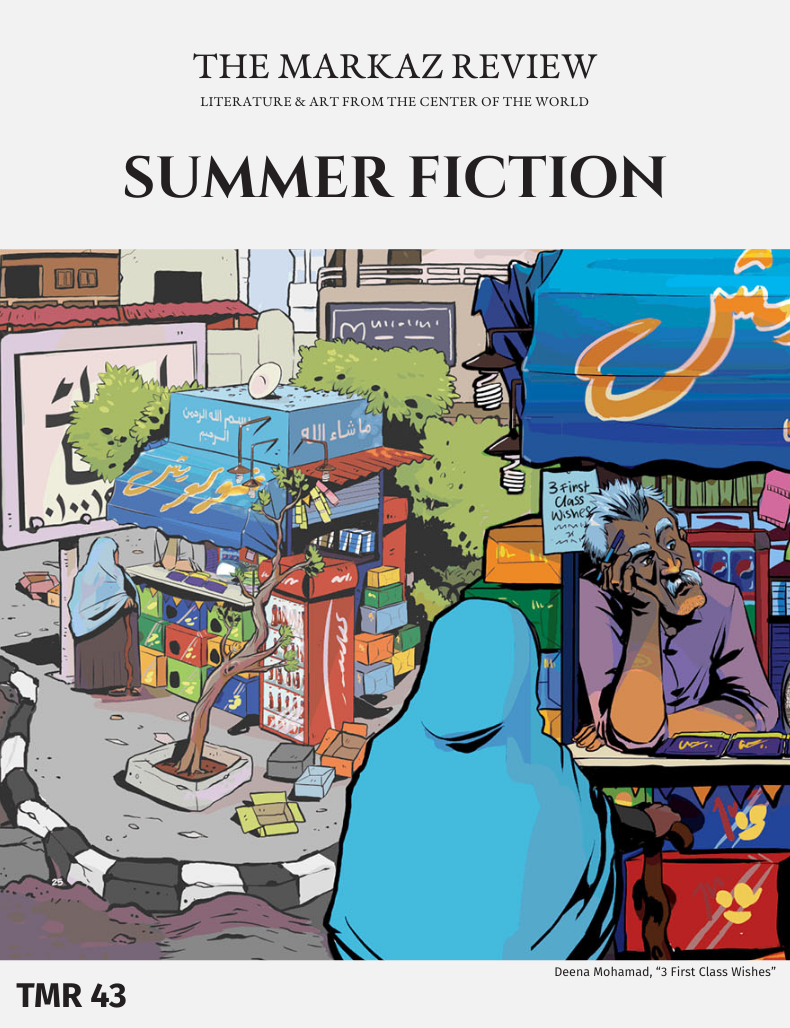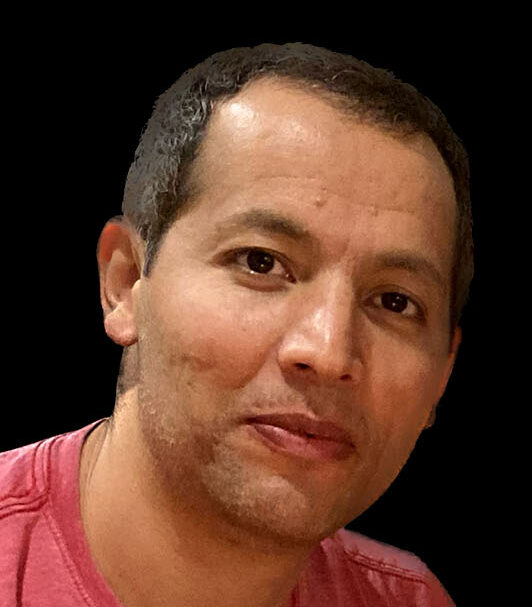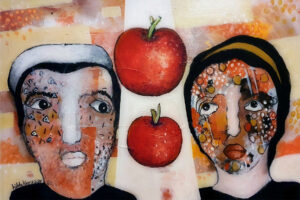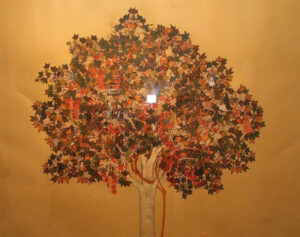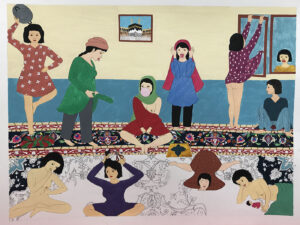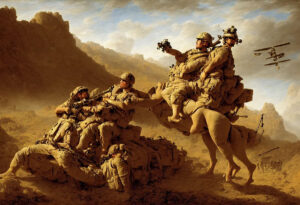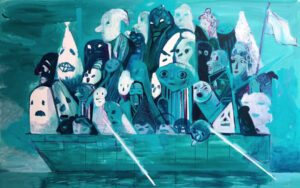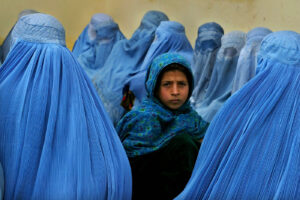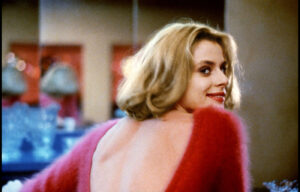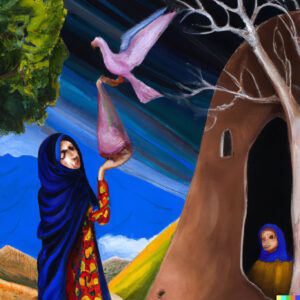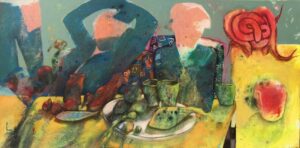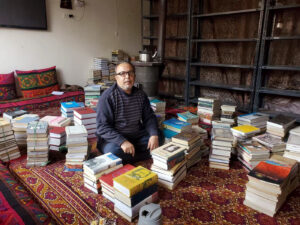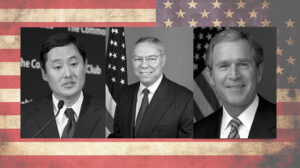Rubina, 14, lives with her enterprising mother in Kabul. Then her absent father comes home.
Rubina, 14, lives with her enterprising mother in Kabul. Then her absent father comes home.
1
On August 30, 2021, when the Taliban took over Afghanistan for the second time, they promised to allow girls to go to school and women to work in offices — but as the Afghan saying goes, promises were written on ice and left in the sun. Rubina’s dream of finishing school, going to college, and getting her law degree was crushed for good. Her spirit, however, remained intact. She tried to defy the Taliban by cutting her hair short and running like a wild animal through their streets when her mother sent her out on small errands. She was 14, short, plump, and not as attractive as some of the girls in her neighborhood, but every time she stepped out of the house, much older boys chased her for a long time, whispering dirty and sweet lines to her. The neighbors’ girls were jealous of her for getting so much attention. They spread rumors about her and said she only lived for boys, that she was flighty, and even let old men kiss her. She neither denied nor confirmed the rumors because it gave her an air of mystery and sophistication; but there was one aspect to the rumors that she did not like. Some of the neighbor girls claimed that the reason she had become so “loose” was because she lacked a male figure in her family. Indeed, she had no older brother, she was the only child, and she knew her father only through his clean-shaven portrait hanging on her mother’s bedroom wall. Her father was not dead or in prison or living abroad: he was a gold trader who always traveled to places such as India, Dubai, and Kuwait. When he was in Afghanistan to sell his gold, he spent most of his time with his second wife and two sons in Mazar-e Sharif — a ten-hour car ride away from Kabul. He only came to see them once a year for a week, and spent most of his days either taking long naps, talking to people on his cellphone, or going out to meet his friends. He stopped visiting them entirely after Rubina’s ninth birthday. His excuse was that he was expanding his business and could not spare time for socializing. His only remaining connection to them was the money he sent at the beginning of every month for their expenses, which was often delayed by a few days, sometimes up to two weeks. When he was traveling, which was half the year, there was no money. Rubina’s mother had to use her savings to pay for everything.
Mother used to work at the local municipality, in the land-registry department. When the Taliban took over and banned women from working in offices, she started her own tailoring business at home. She was always hunched over her sewing machine, and some nights she worked until two in the morning. Most of her clients were old ladies in the neighborhood who were too traditional to wear imported clothes from China and Pakistan.
Mother was also a good farmer. She grew all kinds of vegetables and fruits in the front courtyard. While she could turn any piece of arid land into a lush garden, or any piece of cloth into a pretty dress, there was not a single striking feature on her face, not even a bold line to catch the eye — as though God had lacked inspiration when creating her. She was aware of her charmless looks, and as a result she said little, seldom laughed, and her whole life was as flat and regular as her smooth, tidy hair. Perhaps that was why Father had left her for another woman.
2
Lately, Mother had spent a lot of time talking to Father on the phone in her bedroom, with the doors shut. In the past, their conversations would only last for a few short minutes before she ran to Rubina’s room and passed her the phone to say hello to him. There was always a lot of noise in the background from Rubina’s stepbrothers, whom she had never met. Father spent more time yelling at them to stay quiet than talking to her. The boys never listened to him, and each time he ended up cutting the conversation short and told Rubina that he would call her back in an hour. He never did.
Recently Mother had stopped coming to Rubina’s room to pass the phone to her. Rubina eavesdropped on her a few times, but she could not hear anything. Mother was probably hiding in her closet. Were they talking about getting a divorce?
One night after dinner, when Rubina went to her room to check her Facebook and Instagram accounts, Mother rushed in, pale and trembling, and announced that her father was coming home the following day. Rubina was taken aback and did not respond. Mother hurried out and returned a moment later with her wedding album, which Rubina had seen a thousand times already. Now Mother in a white dress, now in a red one, now in a purple dress. Father, on the other hand, wore the same white suit in all the photos, looking poised and stern.
“Isn’t he handsome?” Mother kept saying. “He can’t take his creature of a second wife anymore. He is coming home for good.” Suddenly, she got up and stormed out.
Rubina went out to look for her. She found her sitting in front of her vanity table in her messy bedroom, covering her face with a base of foundation before she defined her eyebrows with a pencil and added a layer of pink, silver, and blue shadow on her eyelids. Finally, she curled her eyelashes and put mascara on them. Then she got up, dug through her closet, and retrieved a pair of high heels, which Rubina had never seen before. She put them on with a burgundy skirt and a green blouse. Moving slowly, she walked across the room, watching herself in the closet mirror.
“How do I look?” she asked.
“Gorgeous!” Rubina said, and it was true. Why didn’t she always dress up like that?
Mother scanned the room as if seeing the clutter for the first time. Immediately, she took off her shoes and skirt, put on her baggy jeans, rolled up her sleeves to her elbows, and started collecting the stacks of dresses and her sewing machine, and shoved them into her already-full closet. The doors would not close. She had to use force. When she was done, she said she needed to make room for Father’s clothes. It took her an hour to empty half her closet, put her extra clothes in suitcases, and store them in the basement. Then she was all over the house. One minute she was vacuuming her bedroom, the next minute scrubbing the bathtub, then running to the kitchen to wash the sink while ordering Rubina the whole time to clean the refrigerator, take down the living room curtains, and load the washing machine.
By the time they were done, it was two in the morning. Rubina was exhausted, but Mother seemed to have more energy than ever. She collected the couch pillows, carried them to the courtyard, and started beating them mercilessly.
3
The sun was beaming on Rubina’s face when she woke the following morning. Crossing the living room, she found Mother sound asleep on the floor instead of in her bed, her shapely calves peeking out from beneath the blanket and her hair wrapped in a towel. She sensed Rubina, opened her eyes, and asked if Father was already home.
“I don’t know,” Rubina said. “I just woke up.”
“Then go wash yourself and put on something nice. He’ll be here any minute.”
Mother did not make breakfast that day. She was nervous, touchy, and critical of Rubina’s clothes, even though she had sewn all of them. She did not like Rubina’s orange dress, and told her it didn’t go with her skin tone. Then she made her wear four other dresses only to settle on the orange one after all. If she heard the slightest noise out on the street, she ran to the window and looked at the courtyard gate, and when she saw no one entering, she put her trembling hands on her chest and took a deep breath. Then she walked between the rooms, looking for something to do.
Rubina was haunted by an impatient longing to see Father after five years. For some reason she imagined him to be a tall man with broad shoulders, a deep voice, and an overpowering personality, even though he was a small man with a shrill, womanish voice. She thought he would walk into the room any minute, dressed in his paper-white suit like the one he was wearing in his wedding photos and look condescendingly at their unpainted walls, the broken tiles in the bathroom floor, and the crooked kitchen cabinets. How should she greet him? Should she hug him? No, that would require a certain spontaneity she did not possess.
Finally, there was a knock at the courtyard gate.
4
“Come with me!” Mother rushed out.
But Rubina remained standing in front of the window in the living room. Her heart was beating so fast she thought it would pop out of her mouth any minute. She watched Mother open the gate and let a man dressed in black shalwar kameez enter with a large suitcase. She did not want to see the rest. She ran to her bed and pulled the blanket over herself.
“Rubina?” Mother hollered. “Your father is here.”
She flew out of her bed, straightened her dress, and went to the courtyard, but she was disappointed to see that her father no longer resembled the man she remembered. Now he was as bald as an egg; his cheeks had grown puffy; and his mustache made him look like a thug. He was holding Mother’s hand, walking through the garden and commenting on something. She could not hear him; there were masses of sparrows in the mulberry tree. She went up close behind him.
“What haven’t you got here?” he was saying to Mother while looking at the trees. “Apples, pears, apricots, plums, cherries, almonds …” Then he scanned the vegetable garden. “Eggplants, pumpkins, cucumbers, okra, beans, mint, parsley …” Then he pointed to the chicken coop and the beehives in the corner of the courtyard. “The hens are laying you eggs, the bees are making you honey, and the bountiful Earth is giving you all the vegetables and fruits you need. What a life!”
Mother smiled stiffly and remained silent.
“Invigorating!” he sniffed a rose. “Had I known that you had turned this place into a little paradise, I’d have moved back a long time ago.”
Rubina prepared herself to face him despite the cold, sinking feeling in her stomach. She ran and stood in front of him and said salaam — only salaam. Her sudden appearance startled him, which made him take a step back as though a dog was about to attack him.
“Your daughter Rubina,” Mother said.
“My gracious God!” he exclaimed. “Look at you! You’ve grown so tall. Come, come.” He pressed her into his chest and sniffed her head. “Your hair smells like a spring breeze.” Suddenly, he let go of her, cleared his throat, and walked away. “A fine girl.” He stopped and turned around. “Come, come, let me take a good look at you.” He held her face in his hands. “You are a woman now. Soon there’ll be a line of suitors behind the gate, knocking day and night. What should I tell them?”
Rubina looked at Mother for help, but Mother went on smiling stiffly. He kissed her on both cheeks. His breath smelled like a dead mouse. He let go of her face and sniffed a rose, then another, and another. Suddenly he looked up and pointed to their neighbor’s daughter standing on their flat rooftop, drying her hair in the sun, and asked Mother who she was.
“Gulshan,” Mother said. “Don’t you remember her?”
He waved at her. Gulshan reluctantly waved once and walked away.
Gulshan had been in her last year of residency to become a pediatrician when the Taliban took over, but that did not stop her from pursuing her career. She treated the neighbors’ children at home without a license for a fraction of the hospital fee, and yet it was not her skill as a doctor but her Barbie-doll beauty — long neck, red hair, green eyes — that charmed every man and woman in the neighborhood. Her husky voice added to her allure. She had a way of saying hello that was at once polite, inquisitive, and sensual.
“Invite them over for dinner sometime,” Father said to Mother. “I’d like to get reacquainted with them.”
“Let’s get you reacquainted with the house first,” Mother joked.
5
When Father went to the bathroom, Mother asked Rubina what she thought of him after all these years.
Irritating, phony, and erratic, Rubina wanted to say, but she did not share her thoughts out of fear of being admonished. She just shrugged.
“He speaks a mile a minute now, doesn’t he?” Mother said. She did not wait for a response. She went to the kitchen, put on her apron, rolled up her sleeves, and started cooking lunch: eggplant, okra, rice, pumpkin, and meatballs.
Rubina went to the courtyard to perform her daily chores. She fed the hens, irrigated the vegetable garden, and collected the ripe tomatoes, washed and sliced them, and spread them on a piece of cloth under the apple trees. When she was done, she did not go inside, because her parents were having a good time in the kitchen; Mother sounded as if she was being tickled every few minutes. Rubina retrieved her phone from her pocket, lay on her belly on the lawn, and kept busy checking her Facebook and Instagram accounts until her father hollered from the living room window that lunch was ready. She went in and found him arranging the dishes on the sofra, the rug on which the family ate meals.
“Right on time,” he said, acting as though this was their daily routine. “Take a seat, young lady.” He loaded a plate with eggplants, meatballs, and rice, and handed it to her. Then he filled a plate for himself; but before taking his first bite, he pulled up the corner of his kameez, unbuckled a brown belt that had a small gun attached to it, and casually put it next to him. Then he reached for the remote control on the coffee table, turned on the TV, cranked up the volume, and switched between news channels while eating. He chewed each bite three or four times, swallowed it, and stuffed his mouth with another, while breathing very noisily through his nose. When he wiped his plate clean, he turned off the TV, got up, and belched twice before he told Mother he had to go make a few long-distance calls. He forgot to take his gun with him; Mother and Rubina exchanged looks, but neither of them dared touch it.
6
Every day Father woke early in the morning, prayed in the hallway, polished his shoes until they shone like mirrors, and left without eating breakfast. He said hello to every man and woman on the street. It did not take him very long to make friends with the street cobblers, the shopkeepers, the public bathhouse owner, and the mullah. When he returned after sunset, he took a cold bath while making weird noises, then came to the living room fully dressed, but still shivering. He sat in front of the TV and watched one news channel after another. During dinner he told Mother about his day — whom he had met and what he’d thought of them. Everyone was a “swindler,” an “idiot,” or “a bunch of illiterate and uncivilized good-for-nothing pieces of trash.”
Mother laughed nonstop, even when he said the most offensive things about the women in the neighborhood. In fact, she offered her own opinions about them, and she was unkind, callous, and foul, which was unlike her. They never included Rubina in their conversations, as though she did not exist. Sometimes they cut their conversation short, got up, and retired to their bedroom. Rubina went to eavesdrop on them. Sometimes she regretted it right away; other times, when they talked for hours, she sat on the floor to listen to the whole story.
She learned that Father missed his sons terribly, and still loved his second wife. He had not run away from her to come live with them. He had borrowed a lot of money from some powerful people in Mazar-e-Sharif and invested it all in his gold business. When the Taliban took over and gold prices dropped, he lost everything. Now he was hiding in their house, and every day he went out looking for rich people to invest in his next enterprise. His plan was to make enough money to buy a big house in Kabul and invite his second wife and sons from Mazar-e-Sharif; then all of them would live together.
7
Since the Taliban had taken over and closed the schools, Rubina had made a habit of going to Gulshan’s house every afternoon to spend a couple of hours with Gulshan’s twin sisters, who had been her classmates once. Now all three sisters gathered around her and asked her about her father. She was too embarrassed to tell them the truth — that he hardly talked to her, that he ate like an animal, burped loudly, and farted musically after every meal while trashing everyone in the neighborhood. She invented stories about him: he had bought her and her mother a whole new wardrobe, new shoes, and soon he was going to demolish their rundown house and build a three-story concrete building with an elevator that would go all the way to the third floor, where there would be one large room with a movie theatre at one end and pool tables at the other.
The only person who did not show interest in her lies was Gulshan’s older brother, Ajmal. He was short and stocky, and shaved his mustache and kept his beard long like a religious man. There was something bearlike about his face; and, just like a bear, he was always gloomy and withdrawn. If he entered a room in which everyone was having a good time, conversation would suddenly come to a halt for a few seconds and resume in a much lower tone. He would sit in a corner until one of his sisters brought him a cup of tea. He would drink it in silence, then get up and go to the mosque to pray.
8
As Father had suggested the day he arrived, Mother invited Gulshan and her family over for dinner one Friday. It was a perfect evening; the air was soft, the sky was moonless, and the stars were winking. Father set up a pavilion on the lawn next to the rosebushes, lit scented candles, and put them around the carpet to drive the mosquitoes away. He also changed into a pair of distressed jeans and a white T-shirt that had jazz written in bold letters on the back. Mother was too busy cooking lamb dumplings and a bunch of vegetable dishes to change into her burgundy skirt and green blouse, which she had ironed and left on her bed.
Gulshan and her family arrived when all the food was arranged on the sofra. During dinner, the grownups talked about all kinds of subjects, including politics, the high cost of living, and how nowadays the members of the younger generation, whom they called the social media kids, were all addicted to their iPhones.
“Never mind the social media kids,” Gulshan’s mother suddenly said to Father. “Where have you been all these years?”
“We are living in 2024, Auntie,” he said to her in a loud voice, as if she was deaf, “and I’m the product of the modern life, a modern man who doesn’t have the luxury of spending time with his family and enjoying their company because he has to be elsewhere in order to provide for them.” Then he picked up the plate of rice and offered it to her.
After dinner, the old couple got up and said they needed to take their medication and go to bed. Father insisted that they let Gulshan, Ajmal, and the twins stay and finish the pot of tea with him. The old couple nodded at their children and left.
Father filled everyone’s cups and started asking Gulshan about her favorite food, movies, books, poems, and so on. Whatever Gulshan said, he responded with: Awesome! Excellent! Exquisite! When Mother went to the kitchen to make another pot of tea, he heaved several deep sighs.
At first, Rubina did not understand the sighs or try to fathom their significance, but when she noticed Ajmal staring at Father through the corners of his eyes, she knew something was not right.
“Let’s say you go out now,” Father said to Gulshan while refilling her cup for the third time, “cross the road, get hit by a car, and die — which could happen to anyone — then everything you’ve done so far was for nothing, all in vain.”
“The one who is fated to drown isn’t going to die any other way,” Gulshan said.
“Well, in that case,” Father said with a renewed vigor, “I’d argue that there is no point in sacrificing your youth for anything. Those so-called professionals — doctors, engineers, lawyers, and so on — are so focused on their careers, they forget they have a heart.” He chuckled forcefully. “To be honest, it isn’t their fault. We are told from an early age that if we work hard, there’ll be success, fame, glory, and the love of people, all awaiting us. What a shameless lie! Only one in millions gets all that. For the rest of us, no matter what we do, we are all walnuts — one day we get hammered and shatter into pieces. That’s how life is: unjust and merciless.”
Gulshan shrugged as though trying to tell him there was nothing she could do to change the order of things. Ajmal went on staring at him. Mother was still in the kitchen, and the sound of the kettle heating up could be heard in the courtyard.
“Instead of puffing so many lies into our ears,” Father continued, “I wish our parents had told us to go live freely, originally, aloof from all common cares — just like birds.” He waited for Gulshan to say something. When he received no response, he sighed twice, and added, “I’m no poet or philosopher, but now I know one thing: nobody can lead a happy life without the pursuit of wisdom, and wisdom is a God-given gift, though sometimes it comes with age, too. And here is my wisdom for you: I’m in my mid-forties with two wives, three children, a degree in psychology. I’ve traveled the world, met all kinds of people, experienced wealth and poverty … and finally, I’m beginning to realize that I wasted the precious years of my youth trying to build myself a good future.” He scoffed. “What future? With global warming and all that, the future is bleak no matter how you measure it. The past is either harsh or trivial, and most of us prefer not to think or talk about it. What we are left with is the present, but the present is either dull or tough, or both, and we always complain about it. So, you see, life is filled with pain and uncertainty. Except, there is one thing worth chasing after … and that is our carnal desires; for when we take care of these, both the Earth and the sky rejoice for us.”
Gulshan lowered her head.
“Don’t be embarrassed by my words,” Father went on, becoming more and more animated. “I’m just being blunt. Our biggest tragedy is that we grow old too soon and get wise too late. Let me elaborate on that. You see, we are humans, and carnal desires work silently inside us, yet we never act on them because we are told to suppress them, and we end up leading a life that’s neither life nor death.”
“What kind of life should we lead, then?” Ajmal asked in his bearlike voice.
“An adventurous one,” Father said readily. “Let your heart be an experienced sailor in the sea of love. Let yourself be driven by the will of your flesh. Let …”
“What about society?” Ajmal interjected. “Don’t you care what others say?”
“Why should I?” Father retorted. “No one feeds or clothes me when I’m hungry and homeless. Let them curse and condemn me. It won’t do me any harm or good.” He scrutinized Ajmal. “Judging from your shaved moustache and untouched beard, I assume you are a spiritual type, right?”
Ajmal shrugged.
“Well, you may not agree with me, but let me tell you, spirituality and sexuality are both sacred. Poets concur with me on that, because they know the real truth: that our sole propose in life is to love and be loved; or, to put it simply, to take care of each other’s carnal needs.”
When Mother returned with the teapot, he started talking about the sanctity of marriage, that marriage demanded a certain character, compromise, sacrifice, and that a man should not marry until he was committed, heart and soul.
From the cold look on Gulshan’s face, it was evident that she was bored out of her mind, but Father would not stop preaching about marriage. The more he talked, the more he became long-winded and eventually incoherent. Mother tried to say something to change the subject, but he cut her short and carried on like a broken radio. Mother smiled stiffly, waited a little, and said something about the new purse she had purchased a week earlier. He cut her short again.
One of Gulshan’s twin sisters leaned over and whispered into Rubina’s ear, “Your dad has been eye-fucking Gulshan since we arrived.”
9
From that night onward, every Friday, Gulshan and her family were invited over for dinner. The old couple did not come, but Gulshan, the twins, and Ajmal came. Mother did most of the cooking and serving, Father most of the talking. When Mother went to the kitchen to refill the teapot, Father immediately changed the subject to love and marriage and said things such as: “Smart men should have multiple wives to produce dozens of children and repopulate the Earth with intelligent beings.” He said all that while gazing at Gulshan with the preoccupied look of a young man in love, who was about to declare his feelings but lacked the courage to do so. Instead, he said things like: Yes, I’m aware of my age, but fruits are most delicious towards the end of their season, or, old roosters are the juiciest.
At such moments, Gulshan’s twin sisters nudged Rubina with their elbows, trying to tell her that her father was eye-fucking their sister again. Their joke was no longer funny; it embarrassed her, and in order to distract the twins, she suggested that they play cards. But one night their game was disrupted by Ajmal, who warned Father that he would gouge out his eyes if he saw him glance at his sister one more time.
Father turned pale, and, judging from his terrified and guilty face, it was hard to tell whether or not he was going to say a word in his own defense.
“Did you hear what I said?” Ajmal asked, clenching his fists and teeth at the same time. Father remained silent. He was not carrying his gun that night. Perhaps he needed it to lend him some courage.
“What happened?” Mother rushed in with the teapot. “What is wrong?”
“Sister,” Ajmal said to her, “kick this filth out of your house before he knocks you off the pedestal of respect and decency.” Then he told his sisters they were leaving.
Mother asked Father what had happened in the few minutes she’d been gone, while Ajmal and his sisters got up and hurried out.
“That idiot’s brain is fried with false religiosity,” Father said when they’d left. Then he collected the cups and went to the kitchen. Mother followed him, carrying the teapot.
Rubina went to her room and lay in her bed, but she remained awake for a long time listening to her parents fight in their bedroom. She could not make out their words. All she could hear was that Father was still doing all the talking, while Mother was sobbing. She thought of going in to defend Mother, but was too afraid to do so. She looked out the window at the starry sky and asked God to punish her father severely. A moment later, she had the sudden warm sensation that God had heard her, and was going to do what she had asked for. Indeed, there was a heavy thud that shook the entire house, followed by a scream, as if a body was being ripped apart. She ran to her mother’s bedroom and saw her father lying on the floor, his computer cable tangled around his ankles, and he was curled up, blue with pain, holding his left arm from the elbow. His hand hung in a terrifying way.
“You’ve broken your wrist,” Mother said, looking more shocked than Father. “We should go to the hospital.” She helped him stand and walked him out. “Rubina, come lock the gate behind us.”
Rubina did not move. Her heart was pounding; her head felt woozy, and there was a thudding in her ears. Her ill wishes had never come true before. Why now? She had not really wanted her father to suffer physically. She just wanted him out of the house so they could have their old life back — but he had nowhere to go. She started weeping softly at first, then louder and louder, and finally she became completely unrestrained. Did every girl with a father feel like her?
10
Her parents returned the following morning. Her father’s hand was in a cast hanging from a sling around his neck, but otherwise he looked fine, even rested. Her mother had brown bags under her eyes, which made her look ten years older. She asked Rubina if she had eaten breakfast yet. Rubina shook her head.
“Let’s get you fed, then.” Mother took off her scarf, threw it in the hallway closet, and headed to the kitchen. “I’ll make you some eggs with chives. I’ll have some, too.”
“Have you forgotten what we agreed on?” Father called out after her.
Mother did not respond, though her face expressed resistance and contempt. She opened the hallway closet, put her scarf back on, and went out. Rubina did not want to be left alone with Father. She followed her, even though she did not know where they were going.
11
Gulshan’s parents received them in their living room, where the old couple had just finished eating breakfast. The twins came and took away the dirty dishes. They returned with Ajmal and Gulshan, each carrying a pot of tea, cups, and plates of pastries.
“To what do we owe the pleasure of your visit?” the old man asked Mother as he handed her a cup of tea.
“We’ve been neighbors for many years,” Mother said, stammering at every word, “and I consider you all as my extended family. However, there are things that you don’t know about me. You see, I’m still young, and I should be able to bear more children. Sadly, my fallopian tubes are warped and deformed. Gulshan knows what I’m talking about.” She paused a little too long, which made it appear as though she had lost her train of thought. “Had I been able to give my husband a few more children — a soccer team, which is what he said he wanted right after Rubina was born — he wouldn’t have married his second wife, and I wouldn’t have come here today asking for Gulshan’s hand for him. So life is short, and the world is wide … do I have your consent?” She lowered her head and waited.
The old couple looked at each other, first in amazement and then with alarm.
“With all due respect, sister,” Ajmal broke the silence, twisting his bearlike face into an angry smile, “your husband is one delusional bastard.”
“Behave yourself!” Ajmal’s father hissed at him.
“Even if Gulshan were a monkey, I wouldn’t let her marry him,” Ajmal added.
“Hey!” the old man hissed again. “Is this how one talks to a neighbor?”
Ajmal got up and left the room with heavy steps. An unpleasant silence reigned. Suddenly, the twins started sniggering. Gulshan joined them too, covering her mouth with her hands. Rubina grinned without knowing why. Mother, on the other hand, turned red as she kept her head down.
“Have you all forgotten your manners today?” the old man exclaimed. The girls got up and rushed out of the room, still giggling softly.
“Please tell your husband that we are flattered by his interest,” the old woman said to Mother, “but our daughters will decide whom they’ll marry, not us.”
Mother nodded, got up, and left without saying goodbye. Her tea was untouched. Rubina followed her. As they were descending the stairs, she could not decide whom she hated the most — Gulshan and her sisters, or her father, who was the source of their disgrace.
12
They found Father in the kitchen cooking himself two eggs. He asked Mother if they had said yes. Mother shook her head.
“Why not?” he demanded, looking deeply offended. “Only a fool would deny me.” Mother remained silent. “Did you tell them that I’m a shrewd businessman, highly respected in my industry, and I can bury Gulshan under gold? Did you mention any of that?”
“How much do you owe your debtors?” Mother asked.
“Why? What has that got to do with anything?”
“I have 4,000 in my savings,” Mother said. “Take it all. Go back where you came from and leave us alone.”
The frown on Father’s face slowly turned into a smirk. He asked Mother how she had managed to save so much, and where she kept all the cash. Mother gave him a hateful look as a response.
“Nasty weather!” He turned his back to her and looked out the window. A strong wind was ripping the dead leaves from the trees in the courtyard. “This is what I imagine Hell would be like.” Then he started cursing Gulshan’s private parts with the ugliest words. When he was done with her, he cursed her father, forefathers, and the rotten seed that had given them life.
13
There was a public tap in front of Rubina’s house. Young boys and girls were always gathered there, playing hopscotch or chasing each other. While the driver was loading Father’s suitcase in the trunk of his taxi, the children surrounded Father, asking him for sweets. He joked with a few of them, pulling small coins from behind their ears. They were amused by his tricks and pushed each other while holding their ears to him to produce more coins. Instead, he retrieved a fistful of toffees from his pocket and threw them into the air. The children dispersed, fighting each other over the toffees. Then Father opened his arms to give Mother a goodbye hug, but Mother pointed to the taxi driver and told him that he was waiting for him.
“Don’t think ill of your daddy, my little dove,” he said to Rubina as he ran his hand over her head. “I was your age when the Soviets invaded this country, followed by a brutal civil war; then the tyrannical Taliban took over, followed by the U.S. invasion, and now the Taliban are back in power again. I’m a survivor, and survivors do whatever they can to survive. So don’t blame me, my little dove. Blame those who start wars, destroy cities and countless lives, and leave behind a wounded generation like me.” His eyes welled up as he kissed her on the forehead. As though he was ashamed of his tears, he suddenly turned around and climbed into the front seat. The taxi took off, and all the children ran after it.
“An expensive mistake.” Mother went inside. “But good riddance.”
Rubina remained at the gate. When the vehicle disappeared from sight, she felt as though she had said goodbye to her best friend whom she would never see again. She no longer resented him. She felt sorry for him, pitied him, and even loved him, because he had finally talked to her, and there had been sincerity in his words … and he had called her his little dove. That was what he thought of her, his little dove. How sweet, how tender!
Later that day, when she was helping her mother garden, she could not help mumbling the words her father would say when sniffing a flower: invigorating, refreshing, exuberant. Her mother noticed and asked what she was humming.
“Nothing,” she replied as the words went on echoing in her ears like the lyrics of a song one could not easily forget.




